Some medicines are available without a prescription from a health care provider, like Tylenol (Acetaminophen), Advil and allergy medicine. They are called over the counter (OTC) medicines. The three most common reasons that people may take these kinds of drugs are for physical pain, colds, and upset stomach.
Other medicines need a prescription from a health care provider (for example, antibiotics for an ear infection).
Many health problems are treated by non-prescription or over the counter drugs. There are many different options available to choose from. Ask your Community Health Nurse, doctor or pharmacist (if your community has one).
What is a medicine overdose and how does it happen?
Medicine used correctly can treat illness. However, taking too much medicine, by accident or on purpose, is called an overdose. The symptoms of overdose depend on the medicine taken. People can develop long term problems and even death from overdose.
Overdose can happen with any medicine even with medicine without a prescription.
What causes an overdose?
People may take medicine too often or take too many pills each time. Sometimes overdose happens when medicines are taken together.
How can you prevent overdose?
- Follow instructions provided by your health care provider. Ask them questions and learn about your medicine.
- Always read and follow the directions on the label before you give or take medicine.
- Keep medicine in its original container so you can read the label and remember the dose and what it is for. It is important to understand how much to take, how frequently to take it, and when to stop.
- Keep track of how much medicine you have taken and when you last took it.
- Store medicines safely in a locked box and put it in a high place that is out of a child’s reach.
- Take any expired or unused medicine to your local health centre for proper disposal.
- Tell your health care provider about other medicines you are taking, including over the counter medicine and vitamins.
- Do not share prescription medicines. They are only meant for the person whose name is on the container.
Talk to your health care provider if you have questions about any medicines. If you think someone has overdosed, call your health centre immediately.
Taking care of your physical and mental health
Some people overdose when they have a mental illness or feel stressed or angry. Remember you are not alone. If you or someone you know is struggling with a mental health problem, help is available. Reach out to a trusted friend, family member, teacher, guidance counsellor or Elder. Talk about how you feel and what you are going through. Go to your local health centre to speak with a mental health worker.
It is very important to keep all prescription, over the counter, and illegal drugs locked up and out of reach of children. For more information, visit Poisoning.



